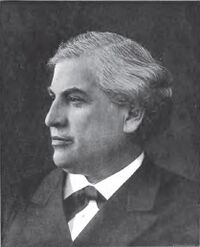Ivan Melnikov: Difference between revisions
m (1 revision imported) |
No edit summary |
||
| (2 intermediate revisions by one other user not shown) | |||
| Line 2: | Line 2: | ||
Russian singer (baritone) (b. 21 February/4 March 1832 in [[Saint Petersburg]]; d. 25 June/8 July 1906 in [[Saint Petersburg]]), born '''''Ivan Aleksandrovich Melnikov''''' (Иван Александрович Мельников). | Russian singer (baritone) (b. 21 February/4 March 1832 in [[Saint Petersburg]]; d. 25 June/8 July 1906 in [[Saint Petersburg]]), born '''''Ivan Aleksandrovich Melnikov''''' (Иван Александрович Мельников). | ||
After graduating from classes in business studies, Melnikov's involvement with his local church choir led him to take singing lessons with | After graduating from classes in business studies, Melnikov's involvement with his local church choir led him to take singing lessons with Gavriel Lomakin (1812–1885). Five years later, in 1866, he travelled to Italy for further training, and made his debut at the Mariinsky Theatre in [[Saint Petersburg]] in 1867 playing Ricardo in [[Bellini]]'s ''I Puritani''. He remained one of the lead soloists at the Mariinsky until 1890, and premiered several roles in Tchaikovsky's operas — Vyazminsky in ''[[The Oprichnik]]'' (1874), The Devil in ''[[Vakula the Smith]]'' (1876), Prince Nikita in ''[[The Enchantress]]'' (1877), and Tomsky in ''[[The Queen of Spades]]'' (1890). He also premiered the title roles in [[Musorgsky]]'s ''Boris Godunov'' (1874) and [[Borodin]]'s ''Prince Igor'' (1890). | ||
From 1890 to 1892 Melnikov served as a director at the Mariinsky Theatre. In 1890, together with [[Fyodor Becker]], he founded "Free Choral Classes" in [[Saint Petersburg]], for which he commissioned Tchaikovsky to write [[Three Choruses (1891)|Three Choruses]] (1891). | From 1890 to 1892 Melnikov served as a director at the Mariinsky Theatre. In 1890, together with [[Fyodor Becker]], he founded "Free Choral Classes" in [[Saint Petersburg]], for which he commissioned Tchaikovsky to write [[Three Choruses (1891)|Three Choruses]] (1891). | ||
| Line 8: | Line 8: | ||
==Dedications== | ==Dedications== | ||
Tchaikovsky dedicated three of his works to Ivan Melnikov: | Tchaikovsky dedicated three of his works to Ivan Melnikov: | ||
* ''[[Der König von Thule (Liszt)|Der König von Thule]]'' — an orchestral arrangement of [[Liszt]]'s ballad (1874) | * ''[[Der König von Thule (Liszt)|Der König von Thule]]'' — an orchestral arrangement of [[Liszt]]'s ballad (1874) | ||
* ''I Never Spoke to Her'' — No. 5 of the [[Six Romances, Op. 25]] (1875) | * ''I Never Spoke to Her'' — No. 5 of the [[Six Romances, Op. 25]] (1875) | ||
* [[Three Choruses (1891)|Three Choruses]] (1891) — dedicated to Ivan Melnikov's Free Choral Class. | * [[Three Choruses (1891)|Three Choruses]] (1891) — dedicated to Ivan Melnikov's Free Choral Class. | ||
==Correspondence with Tchaikovsky== | |||
No letters from Tchaikovsky to Ivan Melnikov are known, but 6 letters from Melnikov to the composer, dating from 1888 to 1891, are preserved in the {{RUS-KLč}} at [[Klin]] | |||
(a{{sup|4}}, Nos. 2831–2836). | |||
==Bibliography== | ==Bibliography== | ||
* {{bib|1939/16}} (1939) | * {{bib|1939/16}} (1939) | ||
* {{bib|1939/40}} (1939) | * {{bib|1939/40}} (1939) | ||
==External Links== | |||
* [[wikipedia:Ivan_Melnikov_(baritone)|Wikipedia]] | |||
* {{viaf|242372863}} | |||
[[Category:People|Melnikov, Ivan]] | [[Category:People|Melnikov, Ivan]] | ||
[[Category:Dedicatees|Melnikov, Ivan]] | [[Category:Dedicatees|Melnikov, Ivan]] | ||
[[Category:Singers|Melnikov, Ivan]] | [[Category:Singers|Melnikov, Ivan]] | ||
[[Category:Correspondents|Melnikov, Ivan]] | |||
__NOTOC__ | |||
Latest revision as of 20:21, 18 August 2023
Russian singer (baritone) (b. 21 February/4 March 1832 in Saint Petersburg; d. 25 June/8 July 1906 in Saint Petersburg), born Ivan Aleksandrovich Melnikov (Иван Александрович Мельников).
After graduating from classes in business studies, Melnikov's involvement with his local church choir led him to take singing lessons with Gavriel Lomakin (1812–1885). Five years later, in 1866, he travelled to Italy for further training, and made his debut at the Mariinsky Theatre in Saint Petersburg in 1867 playing Ricardo in Bellini's I Puritani. He remained one of the lead soloists at the Mariinsky until 1890, and premiered several roles in Tchaikovsky's operas — Vyazminsky in The Oprichnik (1874), The Devil in Vakula the Smith (1876), Prince Nikita in The Enchantress (1877), and Tomsky in The Queen of Spades (1890). He also premiered the title roles in Musorgsky's Boris Godunov (1874) and Borodin's Prince Igor (1890).
From 1890 to 1892 Melnikov served as a director at the Mariinsky Theatre. In 1890, together with Fyodor Becker, he founded "Free Choral Classes" in Saint Petersburg, for which he commissioned Tchaikovsky to write Three Choruses (1891).
Dedications
Tchaikovsky dedicated three of his works to Ivan Melnikov:
- Der König von Thule — an orchestral arrangement of Liszt's ballad (1874)
- I Never Spoke to Her — No. 5 of the Six Romances, Op. 25 (1875)
- Three Choruses (1891) — dedicated to Ivan Melnikov's Free Choral Class.
Correspondence with Tchaikovsky
No letters from Tchaikovsky to Ivan Melnikov are known, but 6 letters from Melnikov to the composer, dating from 1888 to 1891, are preserved in the Tchaikovsky State Memorial Musical Museum-Reserve at Klin (a4, Nos. 2831–2836).
Bibliography
- Мой встречи с П. И. Чайковским (1939)
- Мой встречи с П. И. Чайковским (1939)

